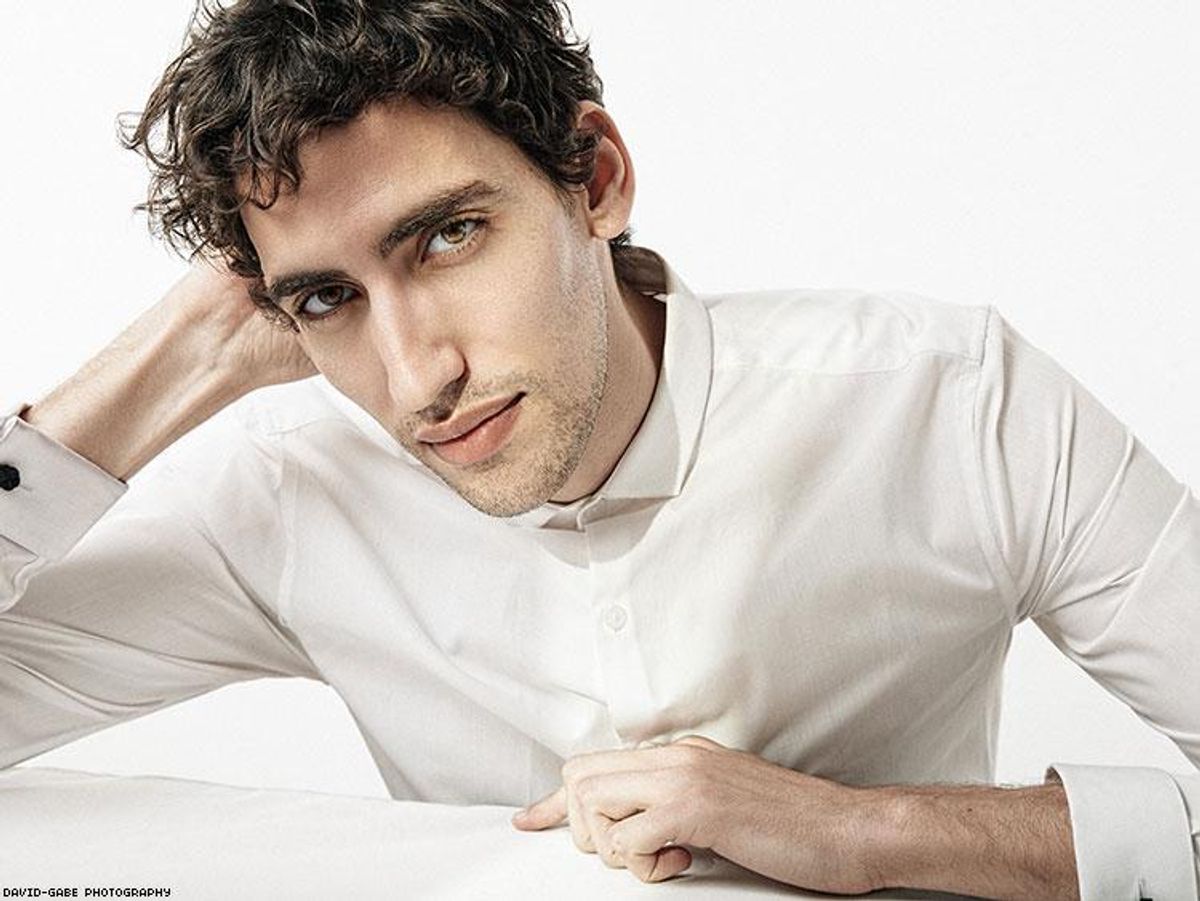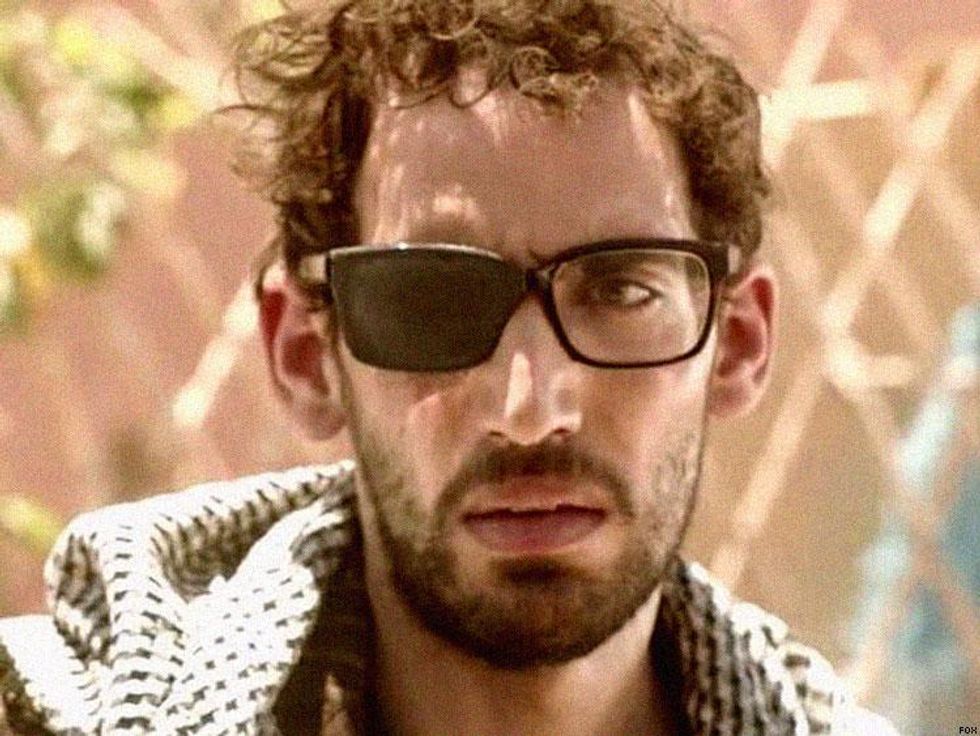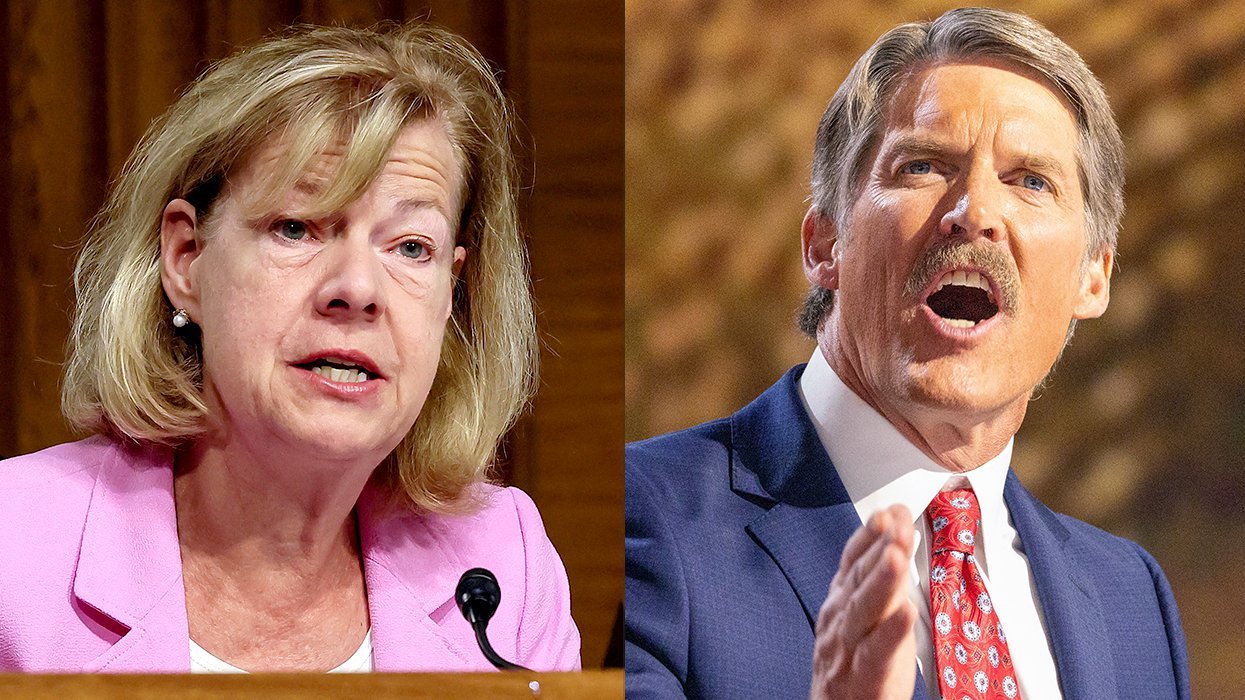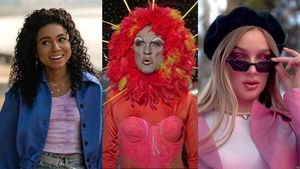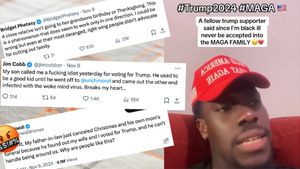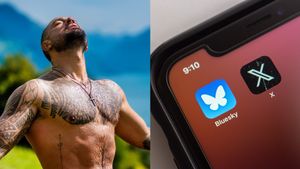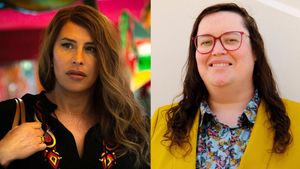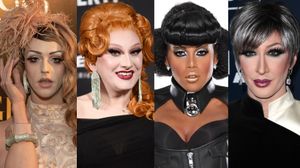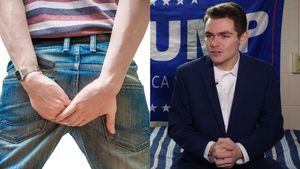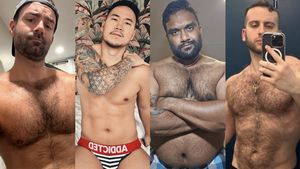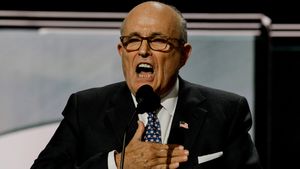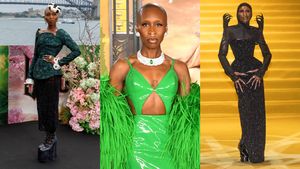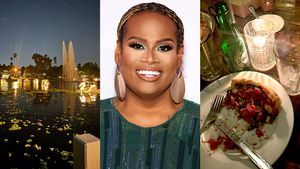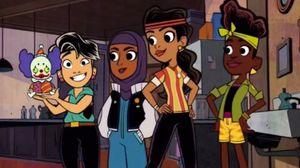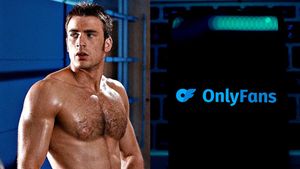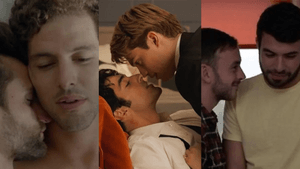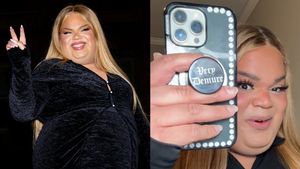Amin El Gamal portrays one of the main villains in Prison Break: Sequel, the rebooted Fox drama starring Wentworth Miller.
Like Miller, El Gamal is an out actor of color. An Arab-American, he is Muslim and gay, and also an ardent activist for intersectional concerns. He is an ally of Black Lives Matter, a volunteer with the International Rescue Committee, and the founder of a support group for LGBT Muslims.
In an interview with The Advocate, El Gamal discussed how he is both excited and "sort of nervous" regarding the public reaction to his latest part -- an antagonist named Cyclops with possible ties to terrorism and ISIS. In today's political climate, when Muslims are being demonized and deported, El Gamal is acutely aware of the impact that depictions on broadcast television can have on a marginalized community.
However, the 31-year-old actor also acknowledged how his visibility matters, in an industry where the glass closet persists and there is a deficit of complex representations for Arab characters. And it helps to have a lead like Miller. The leading man broke new ground when he came out in 2013, in a letter to a film festival in Russia condemning the country's antigay legislation. The moment was an important one for El Gamal.
"I remember feeling very grateful because I always thought of Prison Break as a sort of 'masc' action adventure sort of show," El Gamal said. "To have someone come out who headlined that sort of world, to come out was really powerful. It really showed that gay actors can do anything."
Miller provided more than just a role model. When El Gamal joined the cast of Prison Break: Sequel, he discovered how much it mattered to have other out actors on set, in part due to the material and environment. Filmed in Vancouver and North Africa, the reboot now focuses on an escape from a facility in Yemen -- and a storyline involves the detention of a queer character.
"Especially in some of the harsh and violent situations and environments that we were in, it just felt very comforting to have someone who was there who was like, I see you, I understand your concern," El Gamal said.
Miller, along with another gay actor on set, Augustus Prew -- "so rare, especially on a broadcast show" -- helped El Gamal give complexity and heart to a character who might have been monstrous. In discussions, the trio mapped out a backstory for the character, which gave El Gamal an "in" to the villain. In their reasoning, the character was bullied in the past, and he was out to "prove my masculinity." This history allowed him to connect with his part in ways he hadn't anticipated.
"I really feel my character was a lot about toxic masculinity, and I didn't actually see that until I discussed certain aspects of it with Wentworth," said El Gamal, adding that it added new perspective to his work. "In a way, this is a bit radical, the way that I was cast."
"As an actor, you kind of learn that it's never really a good idea to start from a place other than who you are," El Gamal said. "It doesn't mean that I can't play a character that's not gay. But I think going from my own experiences and using my imagination to build on that makes for a much more compelling character."

El Gamal came out in college -- but he said his sexual orientation was "pretty clear to everyone who knew me," even in his early years. He recounted stories of dressing up like Disney princesses in preschool -- and thanked his mother for supporting him, by providing him with the Little Mermaid's "clamshell bra" as well as license "to perform and to explore my gender."
"There's actually a home video where I'm wearing pearls and I introduce myself to my class as Cinderella," he said with a laugh. "I point to this guy across the room, and I'm like, And that's my prince! Everyone is horrified, but I just didn't care."
His father was less tolerant of his childhood cross-dressing. Like King Triton, he destroyed and threw away his child's "knick-knacks aplenty," including a prized Little Mermaid wig. But that didn't end El Gamal's interest in queer culture. After age 5, he developed an obsession with Judy Garland, seeing all her films and learned to lip-synch to all of her songs. He stressed it was not a camp magnetism that drew him to the Wizard of Oz star and gay icon. It was pure admiration of her talent.
"It was authenticity and vulnerability that she accessed so easily in performances. And I think to this day, I've learned a lot from that," he said.
His parents, immigrants from Egypt, both struggled initially with their son's sexuality. After El Gamal came out his sophomore year at Stanford University, he worried that his family would stop paying for his schooling or cut off communication. On a trip to Egypt, his father forbade him to wear "gay" clothes.
"I basically was playing a role as a straight son for three weeks, and that was very strange," said El Gamal, who said that since then, he's seen his parents make great progress in acceptance.
"Time has healed a lot of it. I think he's evolved in his thinking," he said of his father. "I've helped educate them. So I have to give them credit. My mom very quickly became an ally, and my dad's having a hard time, but he's getting there."
El Gamal acknowledged that time and location were on his side, remarking how his own narrative mirrored the change in the country's attitudes toward LGBT people.
"I was lucky that as my parents were sort of coming to terms with it, the whole country was beginning to pass legislation that was more pro-LGBT," he said. "Who knows if that's gonna change, with what's going on now. But I felt like the popular opinion was shifting in the same time I was coming out. So I was really privileged for that. I was privileged because I grew up in the Bay Area as well, which is a very safe place for LGBT people."
The experience shaped his views on coming out as well as the responsibility for others to do so.
"I used to think that everyone needed to come out and they were cowardly if they didn't, and it was the political statement that everyone needed to make," he said. "But as I've learned about different people's experiences, especially in different countries and different cultures, I'm beginning to learn that it is a matter of privilege. And [it's] a duty you have if you are privileged enough to do it."
As an actor, El Gamal has never been closeted. He saw what could happen if he chose to be firsthand, when he dated an older actor as a graduate student at the University of Southern California.
"I saw the burden of that choice on him, even though he's not in the spotlight as much now," he said. "And I sort of made a decision that I just didn't want that."
"If I can't be true to who I am and set an example for other queer kids who come from an Arab background, what's the point?" El Gamal asked. "What's the point in me being a public figure and trying to be authentic and entertain people if I can't try to change things a bit?"
"I had a really hard time, because I didn't see representations of people like me that were positive, let alone LGBT representation of people of color," he continued. "And I really hated myself for a long time, and I think part of it is, if I can change a little bit of that for a period of time, I would love to. If Hollywood's gonna say they're not ready for me, I guess I'll do something else."
El Gamal has been an actor for five years -- and he's working. His resume includes parts in The Newsroom, Shameless, Transparent, and The Librarians. However, he noted how "really tricky" the parts in Hollywood available to LGBT people of color can be.
"I don't think I found the role that's going to be one of my defining roles yet. I think I'm still looking for that. And it is a difficult task," he said, adding, "To be completely frank, I think I'm going to have to start writing them. I'm not sure that they're just going to appear."
The obstacles are many. He's had to address "homophobic microaggressions" with former representatives, who would ask questions like "Did you butch it up enough?" after auditions. The roles themselves are problematic, trending toward a combination of terrorists and child molesters.
"So, wait, you can't see me playing this completely asexual character, but all of a sudden, I'm a child molester? There's a lot of weird BS to sift through," he said of the Hollywood casting game.
He pointed to Issa Rae, the creator of HBO's Insecure and a former classmate from Stanford, as a possibility model for what he hopes to achieve for LGBT people of Muslim background. As a creator, he could also work to better merge his acting and his activism, which he sees as two sides of the same coin.
"I'm not her by any means at all, but I'm really inspired by her work to create something that is more authentically me, and at the same time, serving an audience that hasn't really been served," he said.
As an activist, he has been "very moved" to witness the historic demonstrations that have occurred since Donald Trump took office. In particular, the airport protests hit home, as they showed intersectional support for Muslim people, the likes of which El Gamal had never before seen in the U.S. -- including from Muslims.
"From my experience, Arab-Americans do not want to be politically engaged or vocal or rock the vote," he said, adding, "They want to play it safe and toe the line so that they can continue making a living."
"There's always this idea of, Don't speak out, don't take any risks. We'll just carry the burden of whatever discrimination we're facing, and be silent about it," he said. "So it's exciting for me to see especially first-generation people like me beginning to go into politics or beginning to speak out in more radical ways and going and being visible."
El Gamal also hopes Hollywood will take more responsibility with its depictions and recognize some of its complicity in creating a culture of Islamophobia.
"Hollywood has really spun a lot of the narrative on how Americans view Arab and Muslim people. And that has in some ways paved the way for legislation like the executive order" on immigration, he said. "So to see some people who are probably perpetuating this going out and marching is a little bit ironic, but I think I'm optimistic enough to believe that people are becoming more aware of these issues and that a change will happen in terms of content."
"Hopefully that means we'll be able to have a few more Muslim or Arab Americans in writers' rooms and as execs who make decisions, because it's kind of hard to get those characters right unless you have someone at top who can help guide the process."
El Gamal finds the tactics of the Trump admistration, which has used homophobia as a justication for its ban on travelers from predominantly Muslim nations, "horrifying." He called it "pinkwashing" and "a trap to try to divide and conquer" different vulnerable communities.
"Yeah, there's homophobia in the Middle East. There's homophobia here also," he said. "I think we should all be very, as a gay community, be very in tune with that sort of thing and speak out against it. I don't think we should fall for that."
El Gamal has a message to LGBT people who are Islamophobic.
"Hate is hate -- it just finds different ways to disguise and justify itself," he said. "So to me, hating an entire religion because of the actions of a few is the same as hating all queer people. It's the same hate. It also denies the intersectionality of identity, like there are Muslims who are also queer and also black. That complicates the narrative of Islamophobia quite a bit, right?"
Initially, El Gamal questioned whether he should take the part in Prison Break: Sequel, due to his fears that America would once again see that "the bad guys are brown, screaming, with guns." But El Gamal, after reviewing the material, appreciated how it complicated the narrative.
"I think some people will roll their eyes when they see the setting of the new Prison Break, but they also do some things that we haven't seen before," he said. "There's a Muslim Arab woman who is one of the leads and who is a good guy. One of the characters that everyone loves has converted to Islam from the original Prison Break, and he is kicking ass as a good guy. There's LGBT [representation] -- an LGBT Arab character. Not all the Arab characters are good or bad. They're not all saintly or evil. There's some complexity in the characters."
"At the end of the day ... there's a queer Arab-American Muslim actor playing a major role on a broadcast show," El Gamal declared of Cyclops. "I don't know if that's ever happened! It's a big step."
Prison Break: Sequel premieres Tuesday at 9 p.m. Eastern on Fox. Watch the teaser below.
